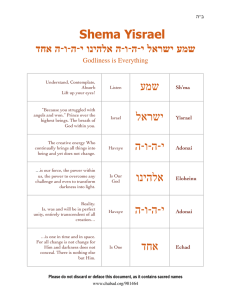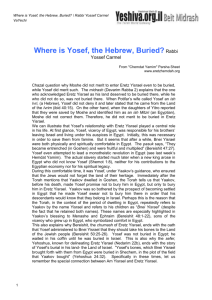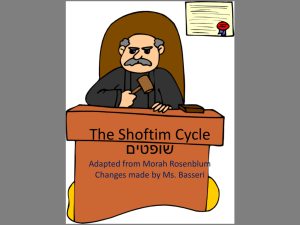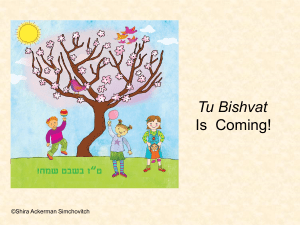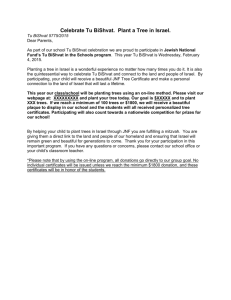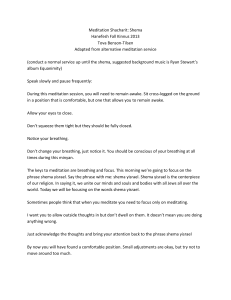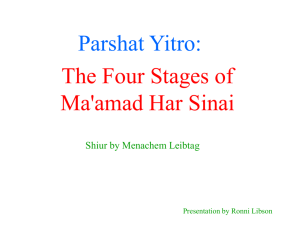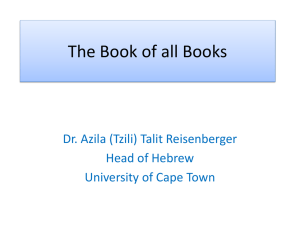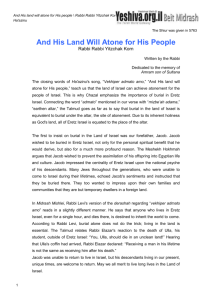Read as Doc file - yeshiva.co
advertisement
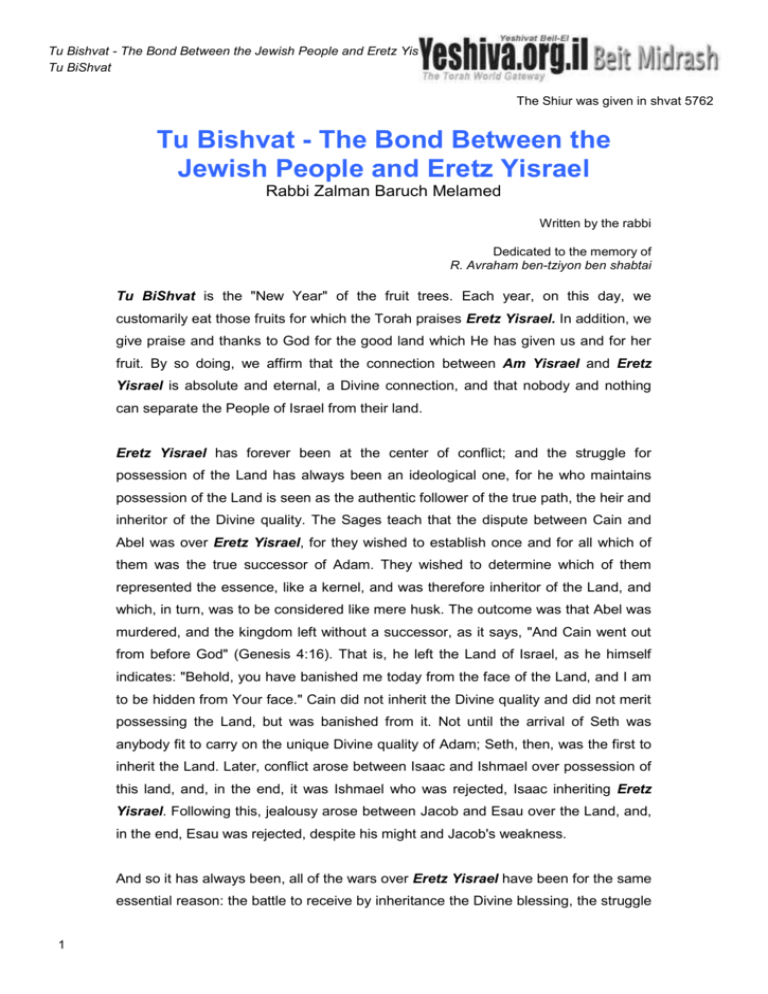
Tu Bishvat - The Bond Between the Jewish People and Eretz Yisrael \ Rabbi Zalman Baruch Melamed Tu BiShvat The Shiur was given in shvat 5762 Tu Bishvat - The Bond Between the Jewish People and Eretz Yisrael Rabbi Zalman Baruch Melamed Written by the rabbi Dedicated to the memory of R. Avraham ben-tziyon ben shabtai Tu BiShvat is the "New Year" of the fruit trees. Each year, on this day, we customarily eat those fruits for which the Torah praises Eretz Yisrael. In addition, we give praise and thanks to God for the good land which He has given us and for her fruit. By so doing, we affirm that the connection between Am Yisrael and Eretz Yisrael is absolute and eternal, a Divine connection, and that nobody and nothing can separate the People of Israel from their land. Eretz Yisrael has forever been at the center of conflict; and the struggle for possession of the Land has always been an ideological one, for he who maintains possession of the Land is seen as the authentic follower of the true path, the heir and inheritor of the Divine quality. The Sages teach that the dispute between Cain and Abel was over Eretz Yisrael, for they wished to establish once and for all which of them was the true successor of Adam. They wished to determine which of them represented the essence, like a kernel, and was therefore inheritor of the Land, and which, in turn, was to be considered like mere husk. The outcome was that Abel was murdered, and the kingdom left without a successor, as it says, "And Cain went out from before God" (Genesis 4:16). That is, he left the Land of Israel, as he himself indicates: "Behold, you have banished me today from the face of the Land, and I am to be hidden from Your face." Cain did not inherit the Divine quality and did not merit possessing the Land, but was banished from it. Not until the arrival of Seth was anybody fit to carry on the unique Divine quality of Adam; Seth, then, was the first to inherit the Land. Later, conflict arose between Isaac and Ishmael over possession of this land, and, in the end, it was Ishmael who was rejected, Isaac inheriting Eretz Yisrael. Following this, jealousy arose between Jacob and Esau over the Land, and, in the end, Esau was rejected, despite his might and Jacob's weakness. And so it has always been, all of the wars over Eretz Yisrael have been for the same essential reason: the battle to receive by inheritance the Divine blessing, the struggle 1 Tu Bishvat - The Bond Between the Jewish People and Eretz Yisrael \ Rabbi Zalman Baruch Melamed Tu BiShvat to determine who is the true heir of the Divine quality. This was what brought about the crusades, and this is what drove the Muslims to conquer Eretz Yisrael. Yet, as the Sages teach, "That which befell the fathers is an indication of what will befall the children." Isaac took possession and Ishmael was rejected. Jacob possessed the Land and Esau was cast out. And here, in our time, the Land has returned to its real owners - Am Yisrael. All of the attempts of the children of Ishmael and Esau to prevent the redemption of Am Yisrael are bound to result in failure. Even the inner weaknesses of the people of Israel - lack of spirit, weariness, exhaustion due to the long and difficult exile - will not prevent the redemption of Israel, for the time of the redemption has arrived. There is no clearer sign of the redemption than the Land giving its fruit abundantly, plentifully, and happily to Am Yisrael as they return to her from the Diaspora. The abundance of fruit in Israel today is such that there is even fruit left over. The Land has prepared enough fruit for even more Jews. She is waiting for all of her children and gives fruit plentifully. The plenty is not simply "extra fruit," rather there is a lack of Jews in Israel today, but they will come and they are coming all the time. All of this talk of withdrawal and the relinquishing of land are in vain. This land has always belonged to Am Yisrael, and always will, as God said, "To your seed have I given this land" (Genesis 15:18) - and the word of God is eternally binding. E-mail : beitel@yeshiva.org.il For more Shiurim from the site: www.yeshiva.org.il 2
